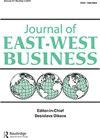FDI Motives and Location Decisions of Emerging Country Business Groups: Entry Mode, Ownership and Institutional Environment
IF 0.9
Q4 BUSINESS
引用次数: 0
Abstract
Abstract The purpose of this paper is to introduce and explain our understanding of the internationalization process of emerging country business groups (EBGs) according to the entry mode choice, ownership structure, and formal institutional environment of the host country. The internationalization models of Dunning and Mathews are integrated with the institutional environment in the internationalization process of EBGs because they are unable to explain the rise of EBGs alone. Content analysis is used to investigate the internationalization strategies of EBGs. The findings of this study revealed three categories of FDI motives: main motives (market-seeking and strategic asset-seeking), sector-based motives (efficiency-seeking and resource-seeking), and facilitative motives (relational asset-seeking). FDI motives, entry mode, ownership, formal institutional environment, and location decisions are investigated together in the context of emerging country dynamics. This exploratory study contributes to the expanding global research on EBGs based on a suggested framework that can provide novel insights regarding the internationalization processes of EBGs.外国直接投资动机与新兴国家企业集团的区位决策:进入模式、所有权与制度环境
摘要本文的目的是根据东道国的进入模式选择、所有权结构和正式制度环境来介绍和解释我们对新兴国家商业集团(EBGs)国际化过程的理解。Dunning和Mathews的国际化模型在ebg国际化过程中与制度环境相结合,因为他们无法单独解释ebg的崛起。运用内容分析法对跨国银行的国际化战略进行了研究。研究结果揭示了外商直接投资动机的三种类型:主要动机(市场寻求和战略资产寻求)、部门动机(效率寻求和资源寻求)和促进动机(关系资产寻求)。外商直接投资动机、进入模式、所有权、正式制度环境和区位决策在新兴国家动态的背景下一起进行了研究。这一探索性研究有助于扩大基于建议框架的EBGs的全球研究,该框架可以为EBGs的国际化过程提供新的见解。
本文章由计算机程序翻译,如有差异,请以英文原文为准。
求助全文
约1分钟内获得全文
求助全文
来源期刊

Journal of East-West Business
BUSINESS-
CiteScore
2.10
自引率
26.70%
发文量
19
期刊介绍:
Journal of East-West Business is a quarterly journal that deals with contemporary and emerging aspects of business studies, strategies, development, and practice as they relate to the Russian Federation, the new republics of the Commonwealth of Independent States, and Eastern/Central Europe-and business relationships with other countries of the world. The Journal of East-West Business is international in scope and treats business issues from comparative, cross-cultural, and cross-national perspectives. The journal features an Editorial Advisory Board that represents the Russian Federation, Eastern/Central European, and Baltic states in this new business arena.
 求助内容:
求助内容: 应助结果提醒方式:
应助结果提醒方式:


